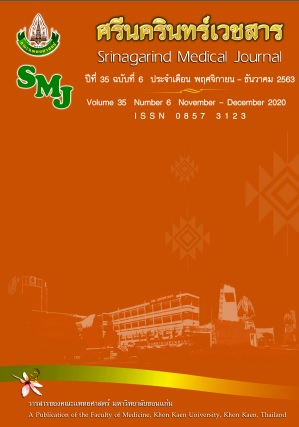Parental Factors Associated with Children's Screen Time in Child Development Center, Khon Kaen Municipality
Abstract
ปัจจัยด้านผู้ปกครองที่สัมพันธ์กับการใช้เวลาหน้าจอของเด็ก ในศูนย์พัฒนาเด็กวัยก่อนเรียน เขตเทศบาลนครขอนแก่น
อารุณลักษณ์ คงยัง1, เบญจา มุกตพันธุ์2*
1หลักสูตรสาธารณสุขศาสตรมหาบัณฑิต คณะสาธารณสุขศาสตร์ มหาวิทยาลัยขอนแก่น
2กลุ่มวิจัยการป้องกันและควบคุมโรคเบาหวานในภาคตะวันออกเฉียงเหนือ และบัณฑิตวิทยาลัย มหาวิทยาลัยขอนแก่น (ผู้รับผิดชอบบทความ)
หลักการและวัตถุประสงค์: ปัจจุบันเด็กใช้สื่อหน้าจอเพิ่มมากขึ้นตั้งแต่อายุน้อย ผู้ปกครองมีบทบาทสำคัญกับการใช้เวลาหน้าจอของเด็ก การศึกษานี้จึงมีวัตถุประสงค์เพื่อหาความสัมพันธ์ของปัจจัยด้านผู้ปกครองที่ประกอบด้วยการรับรู้และพฤติกรรมของผู้ปกครองเกี่ยวกับการควบคุมหน้าจอของเด็ก และระยะเวลาการใช้เวลาหน้าจอของผู้ปกครอง กับการใช้เวลาหน้าจอของเด็ก
วิธีการศึกษา: การวิจัยเชิงวิเคราะห์ภาคตัดขวางในกลุ่มตัวอย่างที่เป็นผู้ปกครองและเด็กอายุ 2-5 ปี ในศูนย์พัฒนาเด็กวัยก่อนเรียน เขตเทศบาลนครขอนแก่น จำนวน 300 คู่ เก็บข้อมูลการรับรู้ของผู้ปกครองเกี่ยวกับการใช้เวลาหน้าจอของเด็ก พฤติกรรมของผู้ปกครองเกี่ยวกับการควบคุมการใช้เวลาหน้าจอของเด็ก การใช้เวลาหน้าจอของผู้ปกครองและของเด็กโดยใช้แบบสอบถามแบบให้ตอบเอง วิเคราะห์ความสัมพันธ์ของปัจจัยด้านผู้ปกครองกับการใช้เวลาหน้าจอของเด็กโดยใช้สถิติถดถอยพหุโลจิสติก
ผลการศึกษา: เด็กร้อยละ 85.7 และผู้ปกครอง ร้อยละ 83.3 ใช้เวลาหน้าจอมากกว่า 1 ชั่วโมง/วัน การรับรู้ของผู้ปกครองเกี่ยวกับการใช้เวลาหน้าจอของเด็กอยู่ในระดับสูง และปานกลาง ร้อยละ 58.7และ 40.6 ตามลำดับ พฤติกรรมของผู้ปกครองเกี่ยวกับการควบคุมการใช้เวลาหน้าจอของเด็ก อยู่ในระดับปานกลางและระดับสูง ร้อยละ 58.0 และ 39.3 ตามลำดับ การวิเคราะห์ความสัมพันธ์พบว่า ปัจจัยที่มีความสัมพันธ์กับการใช้เวลาหน้าจอของเด็ก >1 ชั่วโมง/วัน อย่างมีนัยสำคัญทางสถิติ โดยควบคุมตัวแปรเพศและอายุของผู้ปกครอง ได้แก่ การรับรู้อุปสรรคในการควบคุมการใช้เวลาหน้าจอของเด็กระดับปานกลาง-สูง (ORadj 2.93, 95% CI: 1.22-7.05) พฤติกรรมของผู้ปกครองเกี่ยวกับการควบคุมการใช้เวลาหน้าจอของเด็กในระดับต่ำ-ปานกลาง (ORadj 2.89, 95% CI: 1.29-6.53) และเวลาหน้าจอของผู้ปกครอง > 1 ชั่วโมง/วัน (ORadj 5.51, 95% CI: 2.57-11.83)
สรุป: เด็กส่วนใหญ่ใช้เวลาหน้าจอมากกว่าค่าที่แนะนำ (> 1 ชั่วโมง/วัน) ควรแนะนำให้ผู้ปกครองตระหนักถึงผลเสียของการใช้เวลาหน้าจอของเด็ก หลีกเลี่ยงการใช้เวลาหน้าจอต่อหน้าเด็ก และสนับสนุนให้เด็กมีกิจกรรมทางกายมากขึ้นเพื่อลดการใช้เวลาหน้าจอ
คำสำคัญ : ผู้ปกครอง; เด็ก; ปัจจัยด้านผู้ปกครอง; เวลาหน้าจอ
Background and objective: Screen media usage increased substantially in children’s daily life. Parents play an important role in their children's screen time. The objective of this study was to determine the association of parental factors including parental perception, parents' behaviors regarding screen time control of their children, and parents’ screen time with child’s screen time.
Methods: A total of 300 pairs of parents and children aged 2-5 years old from the Child Development Center, Khon Kaen Municipality participated in this cross-sectional analytical study. A self-response questionnaire was use to collect information including parental perception about child’s screen time, parents' behaviors regarding screen time control of their children, parents' behaviors regarding screen time control of their children, screen time usage of children and parents. The association between parental factors and child’s screen time was analyzed using multiple logistic regression.
Results: Majority of children (85.7%) and their parents (83.3%) used the screen more than 1 hour/day. The parental perception was classified as high and moderate levels accounting for 58.7 and 40.6 % respectively. Parents' behaviors regarding screen time control of children was at moderate and good levels, 58.0% and 39.3% respectively. The variables which statistically associated with child's screen time > 1 hour/day were parental perception on obstacle to control screen time of children at moderate-high levels (ORadj 2.93, 95% CI: 1.22-7.05), parents' behaviors regarding screen time control of children at low-moderate level (ORadj 2.89, 95% CI: 1.29-6.53), and parental screen time > 1 hour/day (ORadj 5.51, 95% CI: 2.57-11.83).
Conclusions: Most of the children used screen time more than the recommended level (> 1 hour/ day). The parents should be aware of the effect of screen time usage of children and should avoid screen time usage midst their children. Children should be encouraged to have more physical activities to reduce screen time use.
Keywords: parent; child; parental factors; screen time


